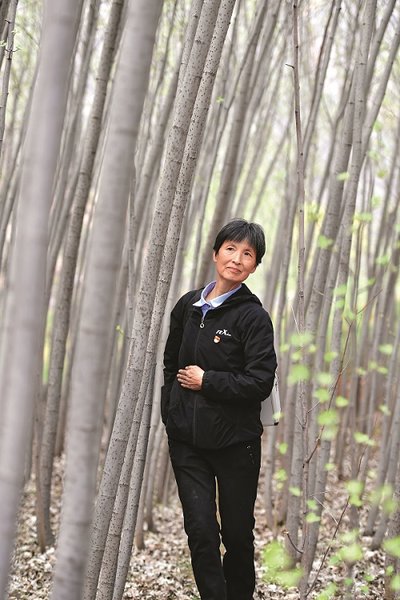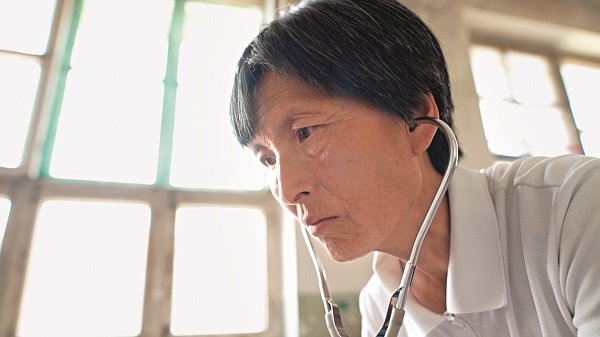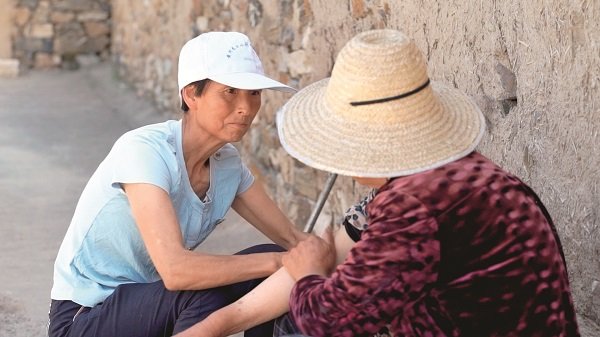Taking Care of Others Adds Value to Life
 |
| Liu Guizhen |
Liu Guizhen, a member of the Communist Party of China (CPC) in Daixian County, Xinzhou, a city in North China's Shanxi Province, has held the positions of village Party chief, village committee director, rural teacher and doctor during the past 40 years. Prior to joining the Party, Liu asked her father what she should do to be a qualified Party member. "Think about others in your heart and try your best to help them" was his reply. That has been the life pursuit of both father and daughter.
The meeting, in a neighboring township, concludes around noon. As soon as it finishes, Liu Guizhen hurries back to her village to discuss improving the environment with several cadres. After that, she helps check the blood pressure of several villagers. From such moments, one can get a glimpse into Liu's busy life.
Liu was born in Duanjiawan, a small village near Nanshan Mountain, in Daixian County. Her father, Liu Baixiao, joined the Party in 1943, and became the village's first Party branch secretary in 1946.
"You are the only person who has received a high school education. Who else could be in the hot seat?" Liu Baixiao once told his daughter.
Her father's words stirred a sense of responsibility in Liu Guizhen. She gave up her opportunity to enter university and, in 1978, she became a rural doctor, so she could serve the local residents.
Ten years later, the only teacher in the village was transferred to another school.
"Just take over the classes until a new teacher comes here. It won't be long," Liu's father told her. Encouraged by her father, Liu Guizhen took on the added burden of being a substitute teacher.
In 1996, Liu Guizhen was elected the village's Party branch secretary. In 2003, she was elected director of the village committee.
Dedicated to Education, Health Care
Previously, the villagers would only go to hospital as a last resort, because they couldn't pay the medical bills. Having a rural doctor in the village had been a common aspiration of the locals for years.
Under this situation, Liu Guizhen went to the city, to study medicine. Half a year later, she completed her studies, returned to the village and began treating patients.
 |
| Liu Guizhen is at work. |
During the years that followed, she devoted herself to research, and her medical skills greatly improved. She taught herself acupuncture, and she has often used this form of TCM (traditional Chinese medicine) to treat the villagers for free. She sometimes uses her own money to buy medicine for villagers in need.
Once, a patient, Chen Zhiliang, spent more than 30,000 yuan (US $4,607) for treatment in a hospital, and that was a heavy burden on his family. Liu Guizhen helped Chen receive reimbursement for those fees through the rural cooperative medical insurance program.
The rural cooperative medical insurance system, implemented by the Chinese Government in 2003, has ensured rural residents have received — without leaving them broke — access to basic health services. Initially, though, many of the villagers were not willing to pay the premium. Liu used her own money to pay the premiums for some villagers. After Chen was reimbursed for his medical expenses, more of the villagers decided to join the program.
Residents in surrounding villages have also asked her to provide medical care to their families. Liu Guizhen's home is more than five kilometers from the furthest village. In the past, bicycle-friendly highways did not exist between the villages; as a result, she had to trudge up rugged mountain roads. Sometimes, she stayed overnight in patients' houses because it was too late to return home.
"I have learned skills that happen to be useful to the folks, so I wish to be worthy of them," Liu Guizhen says.
In 1988, the village's only primary school teacher moved away. Given the village's remote and backward environment, other teachers were not willing to relocate to the village. Parents grew anxious about the suspension of classes. Liu Guizhen once again stepped into the void.
She converted her home into a classroom when the school was being renovated, and she utilized everything she could — including a desk, a bed and a simple blackboard — to teach the students.
Construction of the school was completed in time for the new semester. However, the village had not been able to hire a new teacher. Liu Guizhen continued on as the substitute teacher. She taught Chinese, mathematics, science, and other courses, to students in grades one through five.
In 2006, a new, full-time teacher was finally hired to work at the primary school. However, enrollment had increased, to the point that two full-time teachers were needed. Liu Guizhen, once again, picked up the slack.
She often bought supplies, such as paper and pens, for children in need. Thanks to her efforts, no student quit school. Many of her students graduated to middle school, and some eventually attended university.
"I failed to go to college," says Liu Guizhen. "The children helped me fulfill my dream."
Helping People Acquire Wealth
Liu Guizhen often traveled to other areas to study their experiences, so she could help the villagers increase their incomes.
Given the region's geographical conditions, climate characteristics and various other factors, Liu Guizhen decided to mobilize people to cultivate Pinus tabulaeformis seedlings along the river's bank.
"At the beginning, the villagers were afraid that they might lose money, so no one dared to try it," Liu Guizhen recalls. " I just wanted to make a way out for them."
Liu Guizhen and her husband, Yang Hongsheng, took the lead in cultivating seedlings in the best areas along the river. After two years of careful management, the young saplings grew strong. In the third spring, Liu Guizhen sold some of the trees, and the profits exceeded those of crops like wheat and corn.
News of Liu Guizhen's success spread throughout the village. She went door to door to talk to the villagers about the industry, and to help those interested in picking good nursery areas and in purchasing seeds and fertilizer.
Under Liu Guizhen's guidance, many of the villagers began growing seedlings. In 2017, she set up a cooperative to promote the industry, and she also expanded the sector to neighboring villages.
Liu Guizhen did everything she could to create business opportunities for her fellow villagers. Wild Chinese herbal medicines, such as wolfberries, grow on the hillsides around the village. She encouraged the villagers to go to the mountains to collect such medicines to sell.
Villagers' incomes continue to increase by leaps and bounds. Many of the villagers have purchased new houses in the county, and they have begun living an urban lifestyle.
 |
| Liu Guizhen (L) chats with a villager. |
Helping Others a Family Tradition
Life will be valuable and meaningful if you try your best to help others, Liu Guizhen says. "This is not only an inheritance of my family traditions, but also a standard I set for myself. My father always taught me to think about others in my heart, and I educated my children in the same way."
Yang Junyu, Liu Guizhen's eldest daughter, once worked as a nurse at a hospital in East China's Shandong Province. She repeatedly asked her mother to take a break and visit her home. Liu Guizhen, though, never had free time. She would not leave the village as long as she was needed.
"Standing on the podium, I am a teacher. Out of the classroom, I am a doctor. As village committee director and village Party chief, I will remember people's trust, and the heavy responsibilities," Liu Guizhen says.
Liu Guizhen has received numerous honors in recognition of her efforts and hard work. For example, she has been named a National March 8th Red-Banner Pacesetter, National Model Worker and National Model of Poverty Alleviation. Her family has also been named a National Five-Virtue Family.
Photos by Huang Jianjun and Bian Weiye
(Women of China English Monthly May 2021 issue)
Please understand that womenofchina.cn,a non-profit, information-communication website, cannot reach every writer before using articles and images. For copyright issues, please contact us by emailing: website@womenofchina.cn. The articles published and opinions expressed on this website represent the opinions of writers and are not necessarily shared by womenofchina.cn.

 京公网安备 11010102004314号
京公网安备 11010102004314号